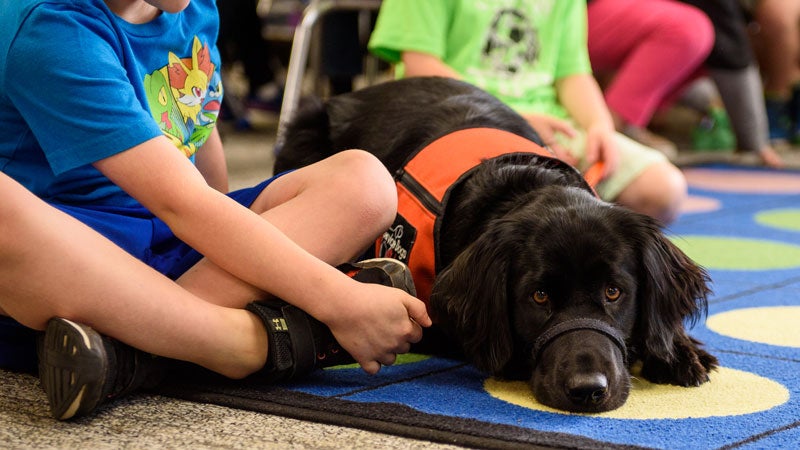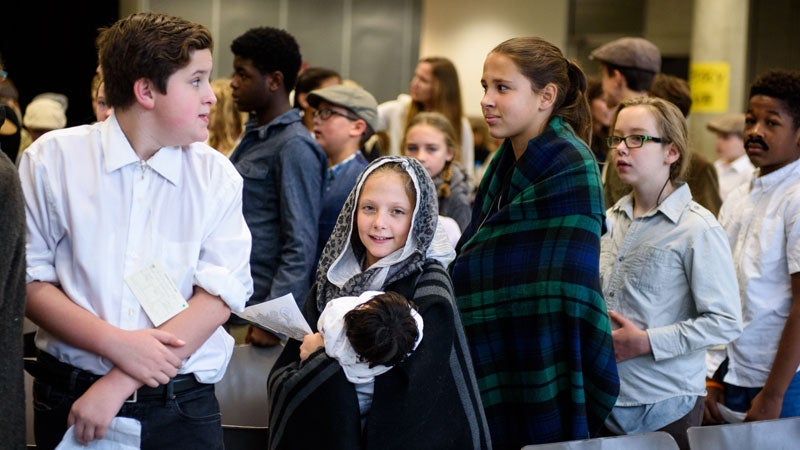On Tuesdays, a special visitor enters Katherine Davis’ classroom as her third graders start their small group activity time. Maize, a 2-year-old black lab-golden retriever mix, walks around and sits with different groups of students as they work—and she does it with a specific purpose in mind, too.
“Two students in my class (particularly) need to be loved, although they might not show it on the outside, and she goes to those two students every time,” Davis recalls. Like other facility service dogs, Maize is trained to pick up on hormone levels and sense if someone is agitated or upset and then spend time with those kids. In short, she finds the students who need her.
So if a child is upset, “(Maize) will calm them down,” Hall-Kent Elementary Principal Kiana Coleman says. “She just has this magical power. It really is like she flips the switch for the kids.”
Even students who didn’t like dogs or were scared of them before will pet Maize now. “She is able to reach students in a different way than the teachers are,” Davis says. “Maize helps to bring some of the shy students who may not even know English together and helps them with their language since they know her commands. Watching her break barriers in the classroom really bonds the students together.”
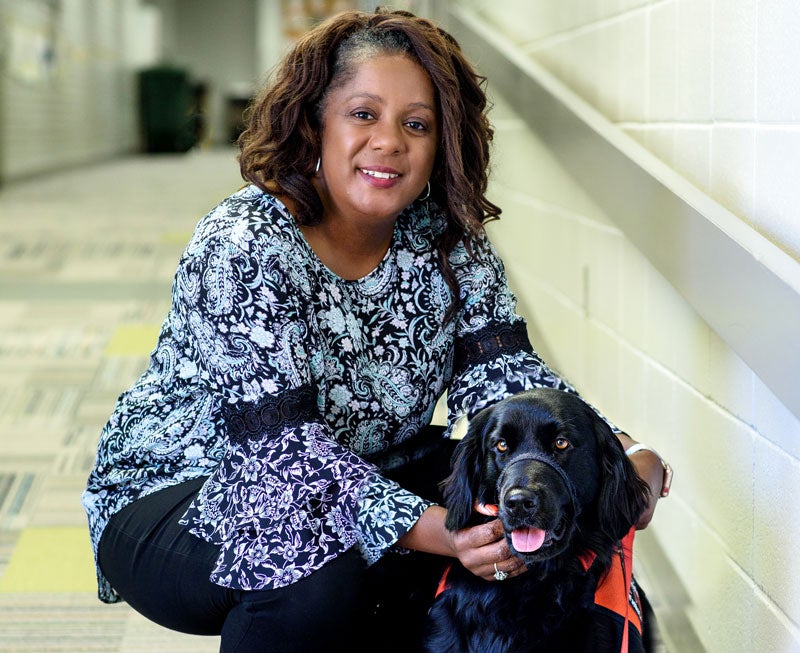 When Maize is in the classroom every student is more engaged, too. “Some of my students who are more shy have come out of their shell when Maize comes in and are more apt to participate,” first-grade teacher Jenna Campbell says. “It encourages a sense of community.”
When Maize is in the classroom every student is more engaged, too. “Some of my students who are more shy have come out of their shell when Maize comes in and are more apt to participate,” first-grade teacher Jenna Campbell says. “It encourages a sense of community.”
Coleman first heard about school facility dogs provided by Service Dogs of Alabama at a principals meeting last year where Homewood City Schools Director of Guidance Leigh Cohen Long shared about them. Coleman has long loved animals, but she was a little skeptical about how it would work to have a dog at school. Then, she visited schools in Elmore County that already had service dogs. “And I just fell in love,” she recalls. “I got to see Popcorn and Mason and Captain, and they were just regular faculty members. They had a schedule, and they walked the hallways. The kids were so used to their presence. I was pumped when I came back.”
Next, she talked to Homewood City Schools Superintendent Bill Cleveland and completed an application, expecting to have to wait until the spring of 2019 to get a match. But then she got a surprise email right before Thanksgiving. “I got teary eyed,” Coleman says. “They had a dog named Maize, and she was a year and a half.”
Before long, Maize was at Hall-Kent for training with Coleman and Assistant Principal Jill Walden, who acts as the dog’s co-handler. Coleman announced to the school that they had a new dog on campus and that they would have to follow some rules, like not petting Maize in the hallway because she is working.
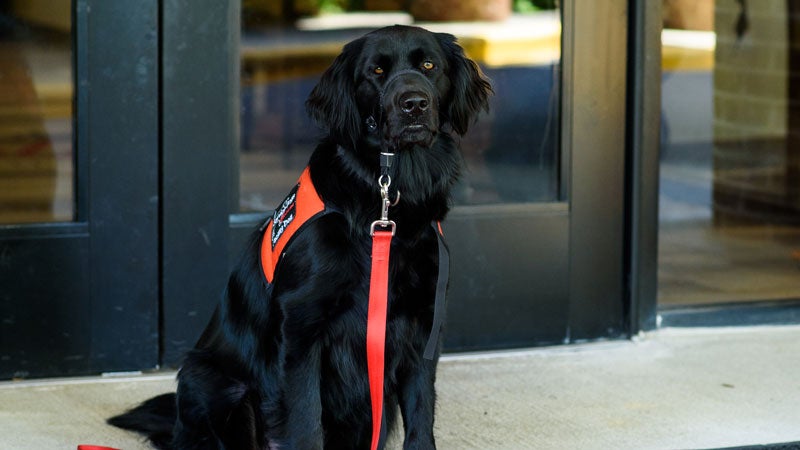 For several weeks, they trained Maize in large spaces like the cafeteria and gym to get Maize comfortable at the school and the students comfortable with and unafraid of her. By the time school got out in May, just as she turned 2 years old, Maize’s weekly schedule had her in 50 classrooms a week in 30-minute increments. If a student is going through something hard during the day, though, Maize might get pulled from her regular duties to spend time with that student.
For several weeks, they trained Maize in large spaces like the cafeteria and gym to get Maize comfortable at the school and the students comfortable with and unafraid of her. By the time school got out in May, just as she turned 2 years old, Maize’s weekly schedule had her in 50 classrooms a week in 30-minute increments. If a student is going through something hard during the day, though, Maize might get pulled from her regular duties to spend time with that student.
In some sense, Maize is now a regular Hall-Kent faculty member, just as Coleman envisioned, and she is by far the most popular. Whenever Coleman walks in the hallways or into the gym with her, students’ faces light up, and all the kids say, “Maize is here! Maize is here!” On their breaks, students will fill up her water or take her for a walk, and they often choose a visit with Maize for an academic or behavior reward. One student came into Coleman’s office one day this spring teeming with excitement. “Ms. Coleman, Ms. Coleman!” she said. “Maize makes me so happy to come to school every day!”
And with 50 commands under her belt, Maize is smart and highly trained, too. She acts immediately when told to jump, lay down, go to sleep, put that up (pick up a leash), take a bow, balance and more, and she picks up new tricks quickly, too.
What does Maize do after school though? Well, she moonlights as the Coleman family dog when she takes off her “uniform.” She plays in the yard and rolls around. She plays fetch with Coleman’s husband and twin middle school-aged daughters. Each morning when it’s time for school, though, Coleman speaks the command, “Maize get ready,” and Maize stands up and gets to attention. Then, she puts on her leader and service vest, and it’s time for work.
Not long after Maize came to Hall-Kent, Shades Cahaba Elementary got its own service dogs, Delta and Russell, who spend their nights and weekends with Principal Dr. John Lowery and Vice Principal Wendy Story respectively. Coleman thinks before long every school in Homewood will have one, too, especially as fifth graders graduate to the middle school and are used to having a dog at school. Homewood Animal Hospital veterinarian Dr. Mike Kilgore has even offered to take care of vet bills for any Homewood school service dogs, as a service to the community. After all, he knows the power of a dog more than most.
Take Maize for example. She’s a comforter. She’s the reason kids don’t want to miss school. She’s a barrier breaker. She’s full of compassion. She’s a blessing.
“We never know what kids are experiencing at home, with grandparents who pass away or (students) who are sad,” Coleman says. “When she comes into that room, she loves them unconditionally. I think that’s Maize’s purpose: she makes us all feel loved and comforted.”
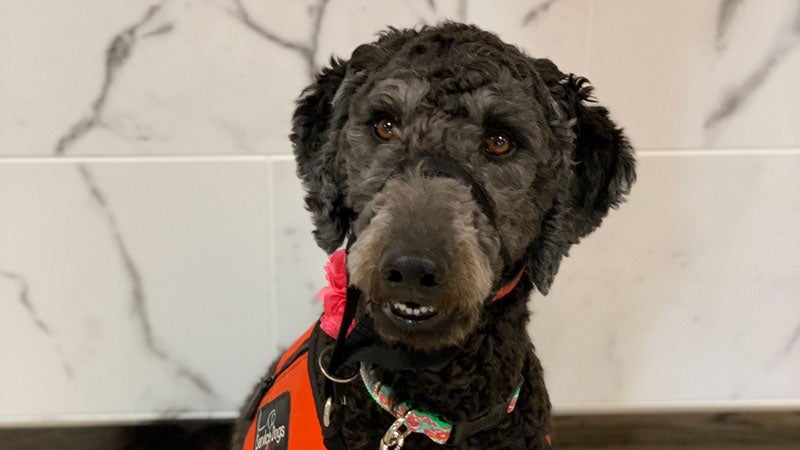 The Other School Service Pups
The Other School Service Pups
Delta
Black Goldendoodle
Guardian: Shades Cahaba Elementary Vice Principal Wendy Story
Russell
Black Labrador Retriever
Guardian: Shades Cahaba Elementary Principal Dr. John Lowery

